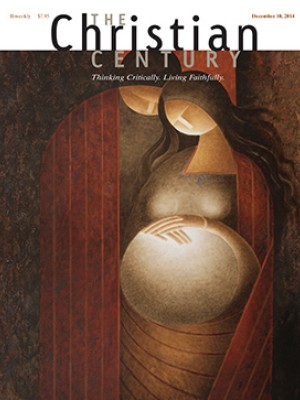Nativity, December 24 and 25, 2014: Luke 2:1-14 (15-20)
It is not as though Mary and Joseph have a choice.
It is roughly 100 miles from Nazareth to Bethlehem. According to Google Maps, it would take 34 hours to travel it on foot, not counting stops for rest. And of course Google does not factor in contingencies such as marauding bandits, deep rain-washed wadis cutting through the path, inns with no room, or full-term pregnancies. But this long, wearying, unpredictable journey is, according to Luke, precisely what Joseph and Mary undertake.
It is not as though they have a choice. This is no vacation jaunt to the old home place. Caesar Augustus has spoken, and like it or not, everybody has to register in the town of their ancestry. Joseph lives in Nazareth but has roots in Bethlehem, and that is that. Days and days of perilous travel ensue, Mary’s water threatening to break at any minute, and the whole dangerous, exhausting journey is just to fill out some government forms. Compared to this, two hours spent languishing in the DMV waiting room seems hardly worth grumbling over.
Read our latest issue or browse back issues.
Historians report that they can find little evidence of this census, but their search is mostly beside the point. For Luke, the mandate from Rome and the journey of two peasants from Galilee to Judea are not primarily geographical or historical matters but theological ones. The question for Luke is where hope might be found for people like Mary and Joseph. They are, like poor and defenseless people everywhere and in every time, at the whim of whatever caesar or mindless bureaucracy or uncaring machinery of state happens to lash out in their direction. Caesar issues a decree, drinks another glass of wine, eats a cluster of grapes—and Joseph and Mary pack provisions and head out on the Roman road to Judea.
In Pieter Bruegel’s painting The Numbering at Bethlehem, one has to search hard to find Mary and Joseph among the village rustics crowding into town. They have disappeared into the anonymity of the powerless. The irony is that while Joseph, Mary, and their unborn child are headed to Bethlehem to be counted, in fact they do not count, not to Rome anyway. They are faceless nobodies under the boot of an uncaring empire. Their only hope—if they have any hope at all—is not in Caesar Augustus, who commands their trek, but in the God of Israel, who accompanies them even when they walk through the valley of the shadow of death.
As American power and affluence increased over the last century, hope became a casualty. We became more confident of our strength and promise, and we began to imagine ourselves as those who need no hope. Who needs hope when you have unfettered progress? Instead, we began to express our longings for the future as “hope nots”: I hope the stock market doesn’t crash again. I hope my children don’t get hooked on drugs. I hope I don’t get Alzheimer’s when I get old—all expressions of the fact that we were steaming ahead complacently, simply hoping that no icebergs lay in our path.
If faith “is the assurance of things hoped for, the conviction of things not seen” (Heb. 11:1), then we soon lost faith because the things we could see, hold, and store up were simply more satisfying. With a firm grip on the good life, we no longer needed to open our hands in prayer. In Hope Against Hope, theologians Trevor Hart and Richard Bauckham observe that societies fueled by progress tend to mark time as the march of centuries, confident that each new century trumps all previous ones, a self-assurance that “allows one to focus on the continuous, forward-moving advance, ignoring the discontinuities and the tragic losses of real history.”
But now it is virtually impossible to ignore the discontinuities and tragic losses. With economies faltering and glaciers melting and terrorists striking, with taxes going toward drones and futile wars, and with electronic invasions of privacy by our own government, we have at least been disabused of the illusion that we need no hope beyond our own resources. We are now all Josephs and Marys, compelled by some distant caesar to travel the weary road.
But the road leads to Bethlehem, and a manger of surprising hope awaits us there. “We felt that we had received the sentence of death,” writes Paul in 2 Corinthians, “so that we would rely not on ourselves but on God who raises the dead.” Dietrich Bonhoeffer compares life in a prison cell to the hope of Advent: “One waits, hopes, does this, that, or the other—things that are really of no consequence—the door is shut and can only be opened from the outside.”
No longer confident of progress, no longer believing Caesar’s empty promise of peace, maybe we are ready again for the hope and wonder of Bethlehem. Like Joseph, we are exhausted by the forced march of greedy empires, but like pregnant Mary, we suddenly realize that we have been carrying the true hope all along: God with us. Listen! Hear once again, sounding over Bethlehem, the angels’ hopeful song of the only peace worth trusting.



